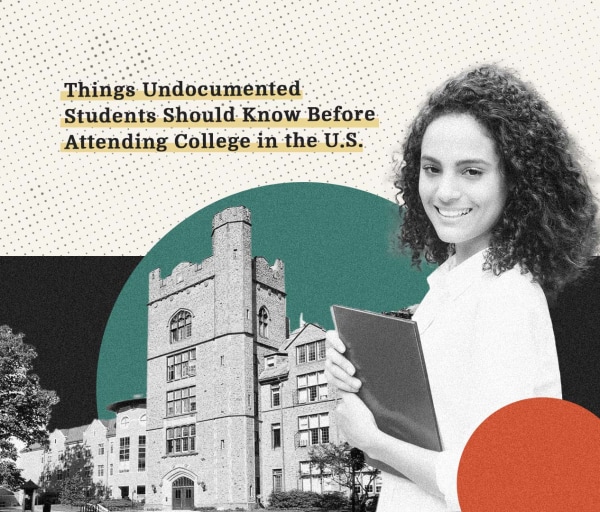Accessing higher education in the United States as an undocumented student is legally possible, yet challenging.
Undocumented students in the U.S. are facing tremendous uncertainty. It's hard enough adjusting to a new culture, finding your footing in a new country, learning a new language, and navigating a new campus, but unpredictable changes in U.S. immigration policies create more uncertainty for immigrant families and young people.
Read on to find out exactly what you need to know to pursue a college education in the United States if you are undocumented.
—
1. It's Legal, but It's Not Easy
Every year, about 98,000 undocumented immigrants graduate from public high schools in the United States. However, less than 10% continue to college, and even fewer complete college and earn a degree.
It's not a mystery why:
- Undocumented students are generally not eligible for federal financial aid, meaning most of them must find alternate ways to finance an education.
- Some states simply won't admit undocumented students into community or public schools, which are often the most affordable and accessible options.
- Many private colleges won't enroll undocumented students as a matter of school policy.
- While undocumented students can often access state financial aid, private scholarships, advocacy groups, and other resources, they still face language barriers, cultural isolation, and fear of legal complications, which can prevent them from knowing about, seeking, or accessing these resources.
- Students who are in the U.S. on a student visa can face restrictions around employment, which makes it more difficult to finance an education.
- Changing federal laws — particularly Deferred Action for Childhood Arrivals (DACA) and the Development, Relief, and Education for Alien Minors Act (DREAM Act) — create uncertainty and legal turmoil around the status of immigrants and undocumented students, many of whom have lived in the United States for nearly their entire lives.
- Some undocumented students may not even know that they are eligible to attend colleges and universities in the United States.
The good news is that as an undocumented student, you actually are eligible to attend college. If you are able to access and earn a college degree, in spite of the limitations and obstacles, it can both improve your chances of remaining in the United States and advance your professional fortunes.
—
2. You Have Rights, but They Can Change
To understand why the rights of undocumented students change so much, you need to understand DACA.
The Obama administration created Deferred Action for Childhood Arrivals (DACA) in 2012 as an extension of the DREAM Act. The DREAM Act is a legislative proposal from 2001 that is intended to provide a path to citizenship for immigrants who arrived in the U.S. as minors, but the bill has yet to be approved by Congress.
Until the DREAM Act is passed, undocumented immigrants who arrived in the country as children can use DACA to obtain legal status, pursue education and work opportunities, and be free from legal persecution.
The term "Dreamers" — used to describe undocumented youth who are at risk of being deported — comes from DACA. More than 700,000 young immigrants have qualified for Dreamer status under DACA since its inception. Applicants who have been previously determined eligible must reapply for this status every two years.
In 2017, the Trump administration began phasing out DACA and stopped accepting new applications, though multiple lawsuits challenged this action. Efforts to dismantle DACA were among Trump's most controversial policies.
A court order in 2018 blocked the Trump administration's DACA rollbacks. New applications for DACA resumed in 2021 under the Biden administration.
Two versions of the DREAM Act are currently being considered by Congress: the Dream Act of 2021 and the Dream and Promise Act of 2021. Both bills would provide a path to citizenship for Dreamers.
There are a few resources that can help keep you up-to-date about DACA and the DREAM Act. Make sure you bookmark these resources so that you can refer back to them as you navigate both your education and your residency status.
- The American Immigration Lawyers Association (AILA) offers a detailed explanation of the history of DACA and immediate policy changes impacting Dreamers, as well as ongoing updates on legislative changes, executive actions, and both judicial and advocacy-based efforts to protect Dreamers.
- United We Dream's Education Equity Program offers education-specific support relating to Dreamer status, plus opportunities for educational advancement.
- Jump to the bottom of this page for more support resources for undocumented students.
—
3. Your Access Varies by State
Every college has its own policy on admitting undocumented students, and state laws similarly vary. Public or private, some schools simply won't admit students without legal status.
State laws can impact your eligibility to attend a public university, receive state-based financial aid, or pay in-state rates, and the policies vary widely by state.
Whether you can access and finance your education as an undocumented student will depend on your state of residence. Some states have laws designed to assist undocumented students seeking admission to public universities, offering access to in-state tuition rates and state financial aid. Other states have laws restricting these opportunities.
The Perks of Online College
Online college can be a good solution for undocumented students, especially those in states with restrictive laws. By studying online, you can take classes from a safe and private location while earning a reputable online degree from schools in more permissive states. Some schools even offer in-state tuition for all online students, regardless of where they live.
Remember that every school has its own set of policies about whether or not it accepts undocumented students. Some online schools do, while others don't. You may have to contact schools for more information about their acceptance policies and application requirements.
According to the National Conference of State Legislatures, as of 2021, 17 U.S. states have created legislation specifically allowing undocumented students to pay in-state tuition rates. They are:
- California
- Colorado
- Connecticut
- Florida
- Illinois
- Kansas
- Maryland
- Minnesota
- Nebraska
- New Jersey
- New Mexico
- New York
- Oregon
- Texas
- Utah
- Virginia
- Washington
In addition, the Boards of Regents in the following states allow access to local tuition rates for undocumented students attending public state university system schools:
- Hawaii
- Kentucky
- Maine
- Michigan
- Ohio
- Oklahoma
- Rhode Island
Arkansas provides in-state tuition eligibility only to undocumented students who have federal work permits or Dreamer status under DACA. Two universities in Delaware — Delaware Technical Community College and the University of Delaware — allow undocumented students to access in-state tuition and finanical aid.
In Virginia, certain students are eligible for in-state tuition regardless of their citizenship or immigration status. These students must have attended a Virginia high school for at least two years, graduated, and been accepted into a higher education university. Students or their parents must also have paid Virginia income tax for two years.
Of the states listed above, there are six states that currently provide both in-state tuition rates and access to state financial aid for undocumented students:
- California
- Minnesota
- New Mexico
- New York
- Texas
- Washington
Note that the following states have passed laws that explicitly prohibit undocumented students from receiving financial aid:
- Alabama
- Arizona
- Georgia
- Missouri
- Indiana
- South Carolina
Similarly, the following states have laws that prohibit undocumented students from attending public college or universities in the state altogether:
- Alabama
- Georgia
- Indiana
State Financial Aid Access for Undocumented Students
—
4. Applications Might Be Challenging
As an undocumented student, you face both financial and bureaucratic challenges, such as completing a Free Application for Federal Student Aid (FAFSA). These challenges are considerably greater if you don't have DACA status.
Some colleges require students to provide a Social Security number, a valid driver's license, or a state ID during the application process. While DACA recipients usually have the proper documentation to offer instead of these materials, undocumented students without DACA status likely don't.
All undocumented students — both DACA recipients and non-DACA immigrants — are ineligible for federal financial aid. However, individual state and universities may provide aid for undocumented students, often on a need-by-need basis.
If you are a DACA recipient, filling out your FAFSA form can help you determine eligibility for financial aid through either your university or your state. It can also help you prepare your application for private scholarships.
What Is FAFSA?
By filling out a Free Application for Federal Student Aid (FAFSA) form, students can request federal grants, access work-study, and take out loans to help pay for their education. While all undocumented students are ineligible for federal student aid, the FAFSA form can help you receive state or college financial aid.
You may be concerned that filling out the form will implicate yourself or your family to Immigrations and Customs Enforcement (ICE). But, the Family Educational Rights and Privacy Act (FERPA) strictly protects the privacy of students' information. According to Michelle Lapointe, an attorney with the Southern Poverty Law Center, school officials can't share that information with immigration enforcement. Furthermore, the FAFSA form does not ask about your parents' status.
One thing you don't have to worry about is standardized testing such as the ACT or SAT, which show colleges and universities how prepared you are for postsecondary education. The ACT and SAT do not ask students to provide a social security number.
Pandemic Aid Is Available for Undocumented Students
Undocumented students can now access some of the $36 billion in emergency stimulus aid earmarked for colleges during the COVID-19 pandemic. The Trump administration previously prevented these students from accessing emergency aid to cover food, housing, and school supplies. Contact your school's financial aid office for more information.
—
5. You Can Utilize Support and Resources
Undocumented students have a right to seek a college education in the United States, but it's much harder than it is for students with full legal status. If you are undocumented, you have access to resources and support networks that can help you overcome legal, financial, and institutional barriers.
Your first stop should be your university's support network. As you research the top colleges in the country, find out if they offer campus resources for undocumented students. These resources include counseling centers, law centers, and equity centers.
Resource centers for undocumented students are especially common on campuses in states with large immigrant populations, such as California and Texas. The presence of a dedicated resource center can signal that a school is prepared to help its undocumented population.
Campus resources can also open important doors for undocumented students. You can learn more about how to receive financial aid, apply for scholarships, and sign up for tutoring. They can also help you connect with immigrant community groups and cultural support networks, or even access legal counsel.
You can also take your own steps to remain informed and connected. Start with these resources:
These resources can serve as portals to a wealth of contacts, advocacy networks, educational materials, legal action hotlines, scholarships, and community groups. However, this list is not exhaustive; do your own research to find similar resources in your local community.

Header Image Credit: LawrenceSawyer, DMEPhotography | Getty Images
Learn more, do more.
More topic-relevant resources to expand your knowledge.
Popular with our students.
Highly informative resources to keep your education journey on track.
Take the next step toward your future with online learning.
Discover schools with the programs and courses you’re interested in, and start learning today.


